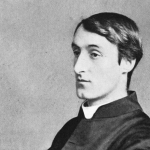I. Until Jove let it be, no colonist
Mastered the wild earth; no land was marked,
None parceled out or shared; but everyone
Looked for his living in the common world.
And Jove gave poison to the blacksnakes, and
Made the wolves ravage, made the ocean roll,
Knocked honey from the leaves, took fire away—
So man might beat out various inventions
By reasoning and art.
First he chipped fire
Out of the veins of flint where it was hidden;
Then rivers felt his skiffs of the light alder;
Then sailors counted up the stars and named them:
Pleiades, Hyades, and the Pole star;
Then were discovered ways to take wild things.
In snares, or hunt them with the circling pack;
And how to whip a stream with casting nets,
Or draw the deep-sea fisherman’s cordage up;
And then the use of steel and the shrieking saw;
Then various crafts. All things were overcome
By labor and by force of bitter need.
II. Even when your threshing floor is leveled
By the big roller, smoothed and packed by hand
With potter’s clay, so that it will not crack,
There are still nuisances. The tiny mouse
Locates his house and granary underground,
Or the blind mole tunnels his dark chamber;
The toad, too, and all monsters of the earth,
Besides those plunderers of the grain, the weevil
And frantic ant, scared of a poor old age.
Let me speak then, too, of the farmer’s weapons:
The heavy oaken plow and the plowshare,
The slowly rolling carts of Demeter,
The threshing machine, the sledge, the weighted mattock,
The withe baskets, the cheap furniture,
The harrow and the magic winnowing fan—
All that your foresight makes provision of,
If you still favor the divine countryside.
III. Moreover, like men tempted by the straits
In ships borne homeward through the blowing sea,
We too must reckon on Arcturus star,
The days of luminous Draco and the kids.
When Libra makes the hours of sleep and daylight
Equal, dividing the world, half light, half dark,
Then drive the team, and sow the field with barley,
Even under intractable winter’s rain.
When shining Taurus opens the year with his golden
Horns, and the Dog’s averted star declines;
For greater harvests of your wheat and spelt,
Let first the Pleiades and Hyades be hid
And Ariadne’s diadem go down.
The golden sun rules the great firmament
Through the twelve constellations, and the world
Is measured out in certain parts, and heaven
By five great zones is taken up entire:
One glowing with sundazzle and fierce heat;
And far away on either side the arctics,
Frozen with ice and rain, cerulean;
And, in between, two zones for sick mankind:
Through each of these a slanting path is cut
Where pass in line the zodiacal stars.
Northward the steep world rises to Scythia
And south of Libya descends, where black
Styx and the lowest of the dead look on.
Winding about the Great and Little Bear—
Those stars that fear forever the touch of ocean;
Sits tight-lipped among the crowding shades,
Or thence Aurora draws the daylight back;
And where the East exhales the yellow morning,
Reddening evening lights her stars at last.
IV. As for the winter, when the freezing rains
Confine the farmer, he may employ himself
In preparations for serener seasons.
The plowman beats the plowshare on the forge,
Or makes his vats of tree-trunks hollowed out,
Brands his cattle, numbers his piles of grain,
Sharpens fence posts or pitchforks, prepares
Umbrian trellises for the slow vine.
Then you may weave the baskets of bramble twigs
Or dip your bleating flock in the clean stream.
Often the farmer loads his little mule
With olive oil or apples, and brings home
A grindstone or a block of pitch from market.
And some will stay up late beside the fire
On winter nights, whittling torches, while
The housewife runs the shuttle through the loom
And comforts the long labor with her singing;
Or at the stove she simmers the new wine,
Skimming the froth with leaves. Oh idle time!
In that hale season, all their worries past,
Farmers arrange convivialities—
As after laden ships have reached home port,
The happy sailors load the prow with garlands.
Then is the time to gather acorns and
Laurel berries and the bloodred myrtle,
To lay your traps for cranes and snares for buck,
To hit the fallow deer with twisted slingshots,
And track the long-eared hare—
When snow is deep, and ice is on the rivers.
V. What of the humors and the ways of Autumn?
Just when the farmer wished to reap his yellow
Fields, and thresh his grain,
I have often seen all the winds make war,
Flattening the stout crops from the very roots;
And in the black whirlwind
Carrying off the ears and the light straw.
And often mighty phalanxes of rain
Marched out of heaven, as the clouds
Rolled up from the sea the detestable tempest;
Then the steep aether thundered, and the deluge
Soaked the crops, filled ditches, made the rivers
Rise and roar and seethe in their spuming beds.
The father himself in the mid stormy night
Lets the lightning go, at whose downstroke
Enormous earth quivers, wild things flee,
And fear abases the prone hearts of men—
As Jove splits Athos with his firebolt
Or Rhodopê or the Ceraunian ridge.
The southwind wails in sheets of rain,
And under that great wind the groves
Lament, and the long breast of the shore is shaken.
If you dislike to be so caught, mark well
The moon’s phases and the weather signs;
Notice where Saturn’s frigid star retires,
Mercury’s wanderings over heaven; and revere
Especially, the gods. Offer to Ceres
Annual sacrifice and annual worship
In the first fair weather of the spring,
So may your sheep grow fat and your vines fruitful,
Your sleep sweet and your mountains full of shade.
Let all the country folk come to adore her,
And offer her libations of milk and wine;
Conduct the sacrificial lamb three times
Around the ripe field, in processional,
With all your chorus singing out to Ceres;
And let no man lay scythe against his grain
Unless he first bind oakleaves on his head
And make his little dance, and sing to her.
VI. When shall we herd the cattle to the stables?
The wind, say, rises without intermission;
The sea gets choppy and the swell increases;
The dry crash of boughs is heard on hills;
The long sound of the surf becomes a tumult;
The gusts become more frequent in the grove;
The waves begin to fight against the keels;
From far at sea the gulls fly shoreward crying;
The heron leaves his favorite marsh and soars
Over the high cloud. Then you will see
Beyond thin skimrack, shooting stars
Falling, the long pale tracks behind them
Whitening through the darkness of the night;
And you’ll see straw and fallen leaves blowing.
But when it thunders in rough Boreas’ quarter,
When east and west it thunders—every sailor
Furls his dripping sail.
A storm should never catch you unprepared.
Aerial cranes take flight before its rising,
The restless heifer with dilated nostrils
Sniffs the air; the squeaking hirondelle
Flits round and round the lake, and frogs,
Inveterate in their mud, croak a chorale.
And too the ant, more frantic in his gallery,
Trundles his eggs out from their hiding place;
The rainbow, cloud imbiber, may be seen;
And crows go cawing from the pasture
In a harsh throng of crepitating wings;
The jeering jay gives out his yell for rain
And takes a walk by himself on the dry sand.
Stormwise, the various sea-fowl, and such birds
As grub the sweet Swan river in Asia,
May be observed dousing themselves and diving
Or riding on the water, as if they wished—
What odd exhilaration—to bathe themselves.
VII. After a storm, clear weather and continuing
Sunny days may likewise be foretold:
By the sharp twinkle of the stars, the moon
Rising to face her brother’s rays by day;
No tenuous fleeces blowing in the sky,
No halcyons, sea favorites, on the shore
Stretching out their wings in tepid sunlight;
But mists go lower and lie on the fields,
The owl, observing sundown from his perch,
Modulates his meaningless melancholy.
Aloft in crystal air the sparrow hawk
Chases his prey; and as she flits aside
The fierce hawk follows screaming on the wind,
And as he swoops, she flits aside again.
With funereal contractions of the windpipe
The crows produce their caws, three at a time,
And in their high nests, pleased at I know not what,
Noise it among themselves: no doubt rejoicing
To see their little brood after the storm,
But not, I think, by reason of divine
Insight or superior grasp of things.
VIII. But if you carefully watch the rapid sun
And the moon following, a fair night’s snare
Never deceives you as to next day’s weather.
When the new moon collects a rim of light,
If that bow be obscured with a dark vapor,
Then a great tempest is in preparation;
If it be blushing like a virgin’s cheek,
There will be wind; wind makes Diana blush;
If on the fourth night (most significant)
She goes pure and unclouded through the sky,
All that day and the following days will be,
For one full month, exempt from rain and wind.
The sun, too, rising and setting in the waves,
Will give you weather signs, trustworthy ones
Whether at morning or when stars come out.
A mackerel sky over the east at sunrise
Means look out for squalls, a gale is coming,
Unfavorable to trees and plants and flocks.
Or when through denser strata the sun’s rays
Break out dimly, or Aurora rises
Pale from Tithonus’ crocus-colored chamber,
Alas, the vine-leaf will not shield the cluster
In the hubbub of roof-pattering bitter hail.
It will be well to notice sunset, too,
For the sun’s visage then has various colors;
Bluish and dark means rain; if it be fiery
That means an East wind; if it be dappled
And mixed with red gold light, then you will see
Wind and rain in commotion everywhere.
Nobody can advise me, on that night,
To cast off hawsers and put out to sea.
But if the next day passes and the sunset
Then be clear, you need not fear the weather:
A bright Norther will sway the forest trees.
IX. Last, what the late dusk brings, and whence the fair
Clouds are blown, and secrets of the Southwind
You may learn from the sun, whose prophecies
No man denies, seeing black insurrections,
Treacheries, and wars are told by him.
When Caesar died, the great sun pitied Rome,
So veiling his bright head, the godless time
Trembled in fear of everlasting night;
And then were portents given of earth and ocean,
Vile dogs upon the roads, and hideous
Strange birds, and Aetna quaking, and her fires
Bursting to overflow the Cyclops’ fields
With flames whirled in the air and melted stones.
Thunder of war was heard in Germany
From south to north, shaking the granite Alps;
And a voice also through the silent groves
Piercing; and apparitions wondrous pale
Were seen in dead of night. Then cattle spoke
(O horror!), streams stood still, the earth cracked open
And tears sprang even from the temple bronze.
The Po, monarch of rivers, on his back
Spuming whole forests, raced through the lowland plains
And bore off pens and herds; and then continually
The viscera of beasts were thick with evil,
blood trickled from the springs; tall towns at night
Re-echoed to the wolf-pack’s shivering howl;
And never from pure heaven have there fallen
So many fires, nor baleful comets burned.
It seemed that once again the Roman lines,
Alike in arms, would fight at Philippi;
And heaven permitted those Thessalian fields
To be enriched again with blood of ours.
Some future day, perhaps, in that country,
A farmer with his plow will turn the ground,
And find the javelins eaten thin with rust,
Or knock the empty helmets with his mattock
And wonder, digging up those ancient bones.
Paternal gods! Ancestors! Mother Vesta!
You that guard Tiber and the Palatine!
Now that long century is overthrown,
Let not this young man fail to give us peace!
Long enough beneath your rule, O Caesar,
Heaven has hated us and all those triumphs
Where justice was thrown down—so many wars,
So many kinds of wickedness! No honor
Rendered the plow, but the fields gone to ruin,
The country-folk made homeless, and their scythes
Beaten to straight swords on the blowing forge!
War from the Euphrates to Germany;
Ruptured engagements, violence of nations,
And impious Mars raging the whole world over—
As when a four horsed chariot rears away
Plunging from the barrier, and runs wild,
Heedless of the reins or the charioteer.


















Comment form: